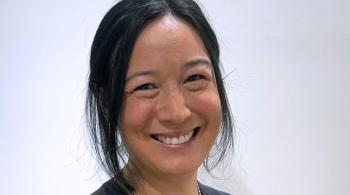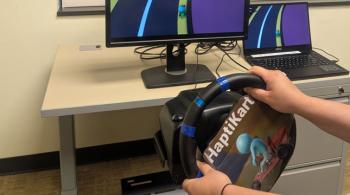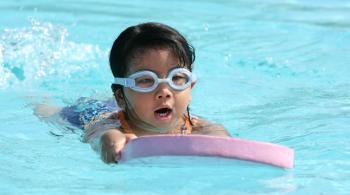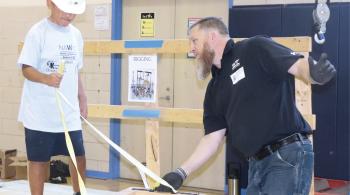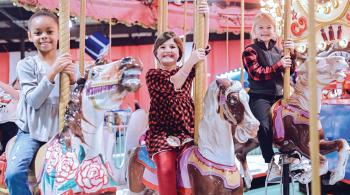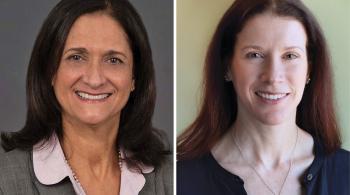Benefits of Inclusion Through Participation in Sports
In this month’s episode of Your Child’s Brain Dr. Brad Schlaggar, President and CEO of Kennedy Krieger Institute, is joined by Jim Schmutz and Abby DiGilio from Special Olympics Maryland to discuss the power of sports and how participation in sports enables individuals with developmental disabilities to shatter stereotypes and succeed, not only on the playing field, but also in life.
Resources
View Episode Transcription
Dr. Brad Schlaggar (BS): Welcome to Your Child's Brain, a podcast series produced by Kennedy Krieger Institute with Assistance from WYPR. I'm Dr. Brad Schlaggar, pediatric neurologist, and President and CEO of Kennedy Krieger Institute. In our last episode of Your Child's Brain, we discussed the connection between exercise, physical activity, and cognitive development in children. This month, we are continuing to talk about the importance of exercise and the powerful impact of participation in sports with an organization that is very near and dear to us at Kennedy Krieger, Special Olympics, and specifically Special Olympics Maryland. Now, Special Olympics International is the world's largest sports organization for children and adults with intellectual disabilities, providing year round training and activities to five million participants and unified sports partners in 172 countries. The mission of Special Olympics is to provide year round sports training and athletic competition in a variety of Olympic type sports for children and adults with intellectual disabilities, giving them continuing opportunities to develop physical fitness, demonstrate courage, experience joy, and participate in a sharing of gifts, skills, and friendship with their families, other special Olympics athletes and the community. Very similar to Special Olympics, the mission of Kennedy Krieger focuses on transforming the lives of children, youth, and adults with neurodevelopmental disorders and disabilities. Indeed, Kennedy Krieger and Special Olympics were both born of the same vision and wisdom, coming from the lived experiences and insights of President John F. Kennedy and his sister, Eunice Kennedy Shriver, having grown up with a sister Rosemary, who had an intellectual disability. During his time in office, President Kennedy, very much, in partnership with his sister Eunice, created funding mechanisms for a federal response to the health and educational needs of individuals with intellectual disability. Kennedy Krieger, which was named the John F. Kennedy Institute when we opened our East Baltimore campus in 1967, was initially established via such funding, and essentially simultaneously, Eunice Kennedy Shriver established Special Olympics with the first games played in 1968 at Soldier Field in Chicago. Now, given our shared origin stories and the alignment of our missions and values, the partnership between Kennedy Krieger Institute and Special Olympics Maryland is a natural one. Both organizations share a common goal of enhancing the lives of people with disabilities. Together, we create a comprehensive support system that addresses both the physical and emotional needs of children with disabilities, fostering a sense of community and inclusion. This partnership exemplifies how collaborative efforts can lead to significant positive impacts on the lives of those both of our organizations serve. We'll be discussing why it's so important to include individuals with intellectual disabilities in all areas of life, especially healthcare access. Individuals with intellectual disabilities often have reduced access to quality medical care, which is an issue that has always been a concern to us, our staff at Kennedy Krieger, who count among our patients and students, many special Olympians from around the Mid Atlantic area. I am very pleased to welcome two of our very good friends from Special Olympics, Maryland, Jim Schmutz, and Abby DiGilio. Jim is the President and CEO of Special Olympics Maryland and Abby is a Special Olympics Maryland athlete and the coordinator for Inclusive Athlete Leadership. Welcome Jim and Abby. For full disclosure, I have the privilege of serving on the Board of Directors of Special Olympics, Maryland. Jim, let's start with you. In the intro, I describe some of the history of Special Olympics, but can you tell us some more about its origins, especially the contributions of its visionary founder.
Jim Schmutz (JS): Brad, first of all, thanks for having Abby and I join you today. It's a pleasure. To build off of your introduction, really the seeds of Special Olympics were sown in the backyard of Mrs. Shriver's home in Rockville, Maryland, dating back to 1962. In the late '50s, she really took an interest in the circumstances of individuals with intellectual disabilities, both from a life perspective, as well as socialization, education, health care, full on identification of the life that individuals were leading. The brilliance of her vision was the transformative power of sports. In 1962, she hosted the first camp Shriver in her backyard, where she invited youth ages between age of six and 16 to come out and enjoy recreational experiences. She invited high school students who were not intellectually disabled to come out as volunteers. That would have been in July of 1962. She had monthly camps through the summer and then repeated those in '63. That evolved. You referenced federal funding under the Kennedy administration. It's not a coincidence that we started to see a level of engagement and investment based on what you described in your introduction. Mrs. Shriver tried to identify individuals both from the medical field, as well as the academic field to figure out how we could reach people with intellectual disabilities in a way through sport that would demonstrate their abilities. That evolved over a five-year period leading up to the games in Chicago, which again, part of your introduction was the value of collaboration and strategic partnerships. The Chicago Park District was instrumental in hosting those first games at Soldier Field in Chicago and really demonstrated the ability of people to come together with a common interest. At that time, and we'll talk a little bit more about this as the conversation evolves, but individuals with intellectual disabilities were too frequently institutionalized and seemingly given no opportunity to excel or demonstrate what they were capable of contributing to our society. Mrs. Shriver saw beyond that and the abilities that could be demonstrated through sport, bring people without intellectual disabilities and to see that, both as volunteers and observers and then learn and grow from that.
BS: In the name Special Olympics is the word special. How do you think of the meaning and the use of that word?
JS: Well, it's very interesting in terms of how people respond to that. I think one of the keys is not to view it as a euphemism, but to see the duality of it. From an educational standpoint, when people talk about special education, they're quick to point out that it's not describing the student as much as it's a description of the type of educational interventions that are appropriate to enable the student to realize their full potential. I think Mrs. Shriver saw the value of that, the specialization. I will tell you if you're coaching a Special Olympics athlete and you enable an athlete to perform to their full potential, you have to fully understand the dimensions of communication beyond verbal communication. There's a specialization as it relates to coaching the individual. But Mrs. Shriver was also quick to point out that we should recognize the special talents and ability of the athletes. I think there's a duality to that that is important to recognize. Mrs. Shriver, again, I think, honestly, the fact that she took Olympics, a global brand at the time, without really going through any process of permissions from the International Olympic Committee attached special to it. The combination of those two words have played a dramatic role in our ability to grow not only within the United States, but as you described worldwide, over 200 countries and 4.55 million athletes around the world.
BS: Who is eligible to participate in Special Olympics events activities?
JS: If you go to the Special Olympics website and you pull up who's eligible, it'll talk about people with intellectual disabilities. It'll talk about people who can demonstrate specialized education. The short version is people with intellectual developmental disabilities. What I will tell you is that as much as there's the identification and diagnosis in the statement of our eligibility statement, if people identify themselves. For example, individuals who are adults who come to our program, we're not asking them to demonstrate that they have an intellectual disability. If they have self identified and they want to be a part of our program, they certainly can be. With the advent of unified sports, we have individuals without intellectual disabilities who are teaming up with our athletes, and we'll talk about this a little bit later. But that manifests itself in our young athletes program, too, so our non-competitive program. From an eligibility standpoint, if people really want to understand who's eligible, it's individuals with intellectual disabilities diagnosed with those needs at an educational level with those type of support systems necessary.
BS: How many sports are offered? Maybe describe some of those that people might anticipate, but also might not anticipate.
JS: You'll hear from Abby about this, too. Globally, there's 30 sports that are recognized as official sports for Special Olympics. We have 28 here in Maryland. Some people, particularly my colleagues and some other states where they might only have 10 or 11, wonder why we do 27 or 28 sports. We just added Pickleball, so that's why it's 28. What I tell them is if we're going to be inclusive and people have identified an interest in participating in the sport that we offer and can provide the level of quality that they deserve, we will. To your point, I think most people we have our summer games at Towson University annually held in June, and we do five sports there. A lot of people when they think of Special Olympics Maryland, they think of that signature of summer games, Towson University. Bocce, cheer, swimming, track and field. Those are five sports. Those are maybe traditional sports particularly track and field, but again, we're year round 28 different sports, and I think that's something that, if nothing else, I hope people take away from this. We're a year round program, and it is deep in those sports. Some unique sports, we have kayaking, which is awesome. We compete at Washington College on the river over there, the Chester River, great competition in kayaking. We have golf, we have Alpine skiing, we have snowshoeing. Those are two premiere winter sports. We have basketball, great team sport, flag football in the fall. We have a Fall Sports Festival at Mount St. Mary's that includes flag football. We have long distance running, power lifting, we've got athletes that are lifting over 400 pounds in the dead lift. The beauty of these sports is when somebody hears, oh, my gosh, you have athletes who can lift 400 pounds? That gets people's attention. What does it take for that athlete to go through training to be able to do that? It's a combination of the cognitive and physical ability. This is where I'll cut myself off because I'm rambling on, but I'm not going to list all 28 sports, but you can get the feel for a wide range of sports that gives our athletes the ability to explore things that they love, and within the sports, I will just reinforce, we offer multiple competitive levels. In basketball, for example, an athlete can enter in skills, where they're just learning how to dribble, do a pass, and shoot drills, and we have scoring mechanisms. We have player development levels where they have a unified teammate who's on the court mentoring the athletes, and then we have the traditional place, so there's a place for everybody in any of these sports.
BS: As a member of the sports committee of the board, I was hoping you would mention pickleball, so thank you for that. Abby, as a Special Olympic athlete yourself, what sport or sports do you participate in and could you share what your favorite is?
Abby DiGilio (AD): Sure. Thank you Brad again for having us on. Jim went into all the sports, which is amazing. I love that we have all the sports, but my favorite sport and my only sport I play is bocce. I compete in bocce, I play with my teammates, and I just love how we get lifelong friendships. I see them all the time in practices, all the time in competitions, and Jim had said we have summer games coming up in a few weeks, and I will be competing in singles on Saturday, which is just me against a bunch of counties, and then doubles on Sunday, which is me and my partner, against a bunch of other partners from different counties.
BS: Fantastic. I'm going to ask you a little bit about your leadership role with the organization, but I'd like to just hear you describe how being an athlete makes you feel.
AD: I feel empowered by being an athlete because I couldn't see myself being an athlete a couple of years ago, but now that I am, I'm like, I will never turn back from being an athlete. I get to be outside. I get to participate. I feel very fortunate that I get to participate in a sport that I love.
BS: That's great. Jim, can you share with us of some stories of some of the athletes who participate? I know there are myriad stories, but maybe share some one or two of your favorites.
JS: Well, I'll build off Abby. Abby, how old are you?
AD: I'm 32, almost 33.
JS: Right. She just talked about how she just started playing bocce, and never thought she would be an athlete, and now she's empowered through that experience. That in and of itself, for me, is a beauty of what special Olympics can do for an individual. Abby is an unbelievable person as it is, but to be able to come in and have that opportunity, based on my interaction with her, this has been an opportunity for her to grow through sport. I think that's a component of Special Olympics that is maybe lost on people as it relates to people with intellectual disabilities, relative to, they've gone through school, they finished school, what happens then? Like anybody else, we want to ensure that they can be better today than they were yesterday, and better tomorrow than they are today. Annu Singleton would be a great example. He's an athlete. Maybe some of your listeners have seen Annu on TV or heard about Annu Singleton. He's an athlete from Baltimore City. During his lifetime in Special Olympics, which dates back to 1997 when he was 8-years-old and started in the Baltimore City Public School program. He's participated in 18 different sports. His most recent is golf. I think the beauty of that in short is that he's had the opportunity to play 18 different sports, and he's chosen to take advantage of that opportunity, and through each one of those experiences, he's learned something different, he's gained confidence about himself, and he applies that in his interaction with people. Now, interestingly, Annu lives independently in Baltimore City. He has not held a long term job, so one of the things that we continue to try to work on with our athletes is empowering them to grow through sport. What we know, there's not a lot of research about individuals with intellectual disabilities, and this is dated. Yale University study, going back to the late '80s, demonstrated that individuals with intellectual disabilities who participate in Special Olympics are 50% more likely to be employed when compared to their peers who have not been in Special Olympics, and they attribute that to simple things like discipline, showing up on time, expectations, teamwork, all the things that come through a sports experience. As far as athlete stories to your point, Brad, there's so many, but Annu stands out during my time here. Adam Hays is another one that people might be familiar with. When I started, Adam has hydrocephalus, and it's water on the brain, and he had surgery as an infant. When I met him in 2013, I think he had maybe 27 brain surgeries, and he had more brain surgeries than his age, and then he had a 10 year hiatus where he had no surgeries. Then in the last three years, I think he's been in the hospital five or six different times for surgeries. He is the epitome of somebody who lives life to the fullest with the greatest optimism. He's a cyclist. During COVID, he rode over 2,000 miles in a 12 month period. What I would say bottom line is every athlete brings something unique and individual to life, from which we can all learn, and that's what inspires me every day for us to not only serve them, but to reach more athletes across the state.
BS: Jim, one of the joys in my job is this partnership that we have between Kennedy Krieger and Special Olympics Maryland. Let's talk about some of that work. Can you tell our listeners about the healthy athletes program, what it is, what its purpose is?
JS: We've got the mutual admiration society going here between Special Olympics Maryland and Kennedy Krieger Institute. I'll just segue a little bit. When we first met, we had a conversation. The synergies between the organizations were clearly there in name alone, and thanks to your commitment, we decided we would take this wherever we could, and so on the healthy athletes side, your team has been unbelievable in working with us and with our athletes. Back in 1997, our international office made a commitment to health, and understanding obviously a healthier more fit athlete is a better athlete, but also recognizing the historical health disparities for people with intellectual disability. We started with a number of disciplines, and it's grown to the point where we have health promotion, we've got an opening eyes program that is globally sponsored and supported by the Lions Club International. We have Special Smiles, which is the dental program. We have Healthy Hearing, which is audiology, we've got Fit Feet. Think about an individual, again, from a communication standpoint, my experience has been individuals with intellectual disabilities, our athletes have demonstrated a higher threshold for pain, some of which results from the inability to articulate and narrow in and focus on where a particular pain might occur. For example, if somebody's not paying attention to a growth spurt of an athlete, and they've been in a Size 6 shoe, and they should be in a Size 8, but they're still wearing a Size 6, in all likelihood, they're going to have some challenges, whether it's an ingrown toe nail or something like that. The preventive components of this is critical. All we got to do is get them in the right size pair of shoes, if they need support systems, those type of things as opposed to having some reactionary medical response by going to emergency room. We have strong minds. Mental health is as important and prevalent among our athletes. Then we've established that healthy young athletes program, which, as you know, from your experience, the earlier we can get individuals in physical activity, it's an accelerator of cognitive development. The socialization that goes with that in the unified environment, where we have neurotypical individuals interacting with non-neurotypical peers, just creates an environment of this is how life is.
BS: I'm going to take a little bit of a departure for a second and when you go to a Special Olympics Maryland event, you're very likely to see signage that says experience inclusion. Talk about what that statement means to you and the Special Olympics community and how the concept relates to a program like healthy young athletes and others that you just described and Abby, I'm going to ask you to comment on that as well.
JS: Brad, thanks for that. We were very intentional on that language of experience inclusion and the point at which you can actually experience, whether it's volunteering for supporting our athletes, being on a unified sports team. Unified sports for listeners is an environment where individuals with intellectual disabilities, our special mix athletes are teamed with their non-intellectually disabled peers to compete on teams against similarly comprised teams. In basketball, you'd have a five player team that would be comprised of three special mix players and two non-special mix players. In golf, we have alternate shot golf, we have one special mix player, one non-special mix player. The beauty, golf is a really good illustration of this. Every stroke counts as a stroke. If the special mix player is a really good player and they hit a 250 down the center of the fairway and the non-special mix player isn't as good and they move the next shot 50 yards, each stroke counts. A stroke, when they hold it out, they've equally contributed to the score on the whole. The point about experience inclusion is we believe that the point at which an individual, in particular, without an intellectual disability experiences inclusion with our athletes, that their life is forever changed. Again, the brilliance of Mrs. Shriver, she saw the transformative power of sport. You read the mission statement at the beginning of this. Clearly the focus is on giving our athletes that experience. But she knew and always stated that the organization was built on the backs of volunteers. What she was able to do is bring volunteers, and particularly people, Brad, I don't have a sibling, a relative, anybody related to me with an intellectual disability. If not for Special Olympics, my life would have been void of these experiences and I know that I am forever different and better because of those experiences, and what we want to do through experience inclusion is give other people like me that opportunity to have the transformative experience.
BS: Abby?
JS: That was perfectly said, Jim. But I was going to piggy back on the unified experience. As Jim said, we have teams with unified partners. Actually, my bocce team is unified. We've got one with an intellectual disability and one non, and they just do great. There's one athlete on my team, Ben Collins who works for SOI, and he partners up with one of his friends, and it's amazing just to see them because I'm experiencing inclusion, like the science says, with watching them, because with Ben because he's blind, they have to ring the bell for him to know where to roll the ball in them. That's really cool that we can adapt to all the needs of athletes that they need.
BS: To be clear, these programs that we were just describing with Healthy Young Athletes Program, are these local, are they national?
AD: They're global on scale. They're out there and I would say that the idea though is to make them as local as possible. The more we do, for example, we do healthy athlete screenings at our summer games and those disciplines I described. The Towson Department of Audiology will come in and they'll do the audiology screenings. We'll work with the Maryland School of Dentistry to do the dental screenings. We'll pull other medical practitioners, experts in the field of the various disciplines in to do the screenings for us. While that's really valuable, we'll have 1,200 athletes come to summer games, are all out there competing, and they go to these screenings when it's convenient based on their competition schedule. We may get 150, 170 athletes who go through those screenings when we have over 8,000 athletes across the state of Maryland. Based on the health disparities with which we're familiar, we continue, and it's really through the partnership with you that we're seeing, particularly with the young athletes program. The ability to reach those individuals sooner with higher quality touches that impact life in a significant way. It's a global program that continues to grow. For us here in Maryland, we see the future being more strategic partnerships in communities. For example, for the first time at our winter games in 2025 out at the Wisp Resort, we did our healthy athletes screenings. Through that effort, we brought in University of Pittsburgh medical students from their school of dentistry to do some screenings there. I think it was a school of dentistry. I might be wrong, but at any rate, we brought students in, and again, it just expanded our network based on what is going to help us reach the athletes in that community out in Western Maryland. I think the other thing I would be remiss if I didn't touch on is Abby is an athlete leader. We have a health messenger program where we're working to connect with medical students across multiple disciplines. Through that interaction, the idea there is if we can prepare those medical practitioners for when they go out and practice their discipline, they will be better equipped to interact in the most positive way possible with individuals with intellectual disabilities.
BS: Abby, this is a great opportunity to ask you to talk more about your role as a leader within the organization. What is the title of your role again and what do you do?
AD: I'm the inclusive athlete leadership coordinator. I work at the athlete leadership department, so we want to be led by the athletes, eventually, so we're trying to get them to have their own ideas and tell us that, we want to do this idea or we want to do this and so when they bring up ideas, we're like, go for it. This is what you need. This is what the materials need. Go ahead and go for it. We're trying to just have them be leaders on and off the field to go out in the community and have opportunities. Actually, just like last night, we had the Brave in the Attempt talks. We had six athletes, and they told their stories of how they're positively progressive and so they would have they came up with a challenge that they have been facing and how they're overcoming it. Actually, I just learned today that one of the athletes after giving his call to action, somebody from the audience came up to him and said, hey, I work with so and so and I would love to partner with you to overcome your challenge.
BS: That's great. That's the Brave and the Attempt talks. I wonder who can attend those? Who can be in the audience for those?
AD: Anyone. Anybody who wants to come and listen to them. Last night we had it in Bethesda at Round House Theater and so I think next year, we move to counties every year, so it'll just to give that inclusive experience.
BS: It is a great experience and I think one of the things we could do on the web page that we devote to this episode to the podcast, we can include a link to information so that listeners can join in among the different ways that they can join in, Special Olympics Maryland including being in the audience for brave in the attempt, which is highly worthwhile. Jim, back to the programs that we were talking about, we have a pilot program that we're working on together. I wonder if you can describe that pilot, but also the process for how special Olympics, there's Maryland. Every state has a special Olympics instantiation. How do you, as an organization, large, take good ideas that work at the pilot level and replicate them so that they can be available to other places throughout the special Olympics community?
JS: Well, it's definitely a challenge. The replication, I think, is probably the biggest challenge. Sharing the information is not as difficult. As an example, the Child and Family Health intervention program is something about which we're really proud in terms of our partnership with you, and there's three dimensions to that, the Young Athletes program, which is a play based gross motor skill, non-competitive. Traditionally or historically, the Young Athletes program has been for individuals aged 2-7. What we've been able to do in collaboration with you, and particularly with leadership from our team, Kayla Shields and McKenzie Ervin and Abby Bom, who has recently left our team. But they saw the need of why do we wait until two. Recently, I was at your early Head Start program in East Baltimore and witnessed the power of being able to have a screening of an individual at six months and to have their parents there and talk about the family support program and as a parent of an infant with an intellectual disability, you're on an island, you don't know what you don't know. To be able to have this level of partnership that gives the opportunities, and it also includes the family health forum classes that your team leads, based on the knowledge, experience, and expertise that you have. Then there's a pediatric health and development screenings that include your OTs and PTs to ensure that to the extent that there can be early intervention to service the needs that you identify those and provide that. In the development, I think people understand this when they hear this. But let's reinforce that you can't get your developmental years back. For individuals with intellectual disabilities, the sooner that those interventions and support systems can be put in place, the more likely that individual is to develop to their maximum potential, because you can't go back and recapture that. You know that better than I do. You can speak to that better than I, but we see it in real time. As it relates to sharing that, one of the things that was really exciting to me about the recent visit was we had three representatives, maybe more from our special mix International headquarters located in Washington, DC, and they work globally. On a global scale, there's many different environments as it relates to societal commitments to people with intellectual disabilities. But to the extent that they can learn from an experience in East Baltimore and take that to other parts of the country, that is a beautiful thing for us. I will say this that there's not a challenge as it relates to sharing the ideas. The biggest challenge is being able to figure out where are the partnerships and where is the capacity. In some of these national programs around the world, of greatest need. The amount of resources available to support those are limited. We feel very fortunate based on the support that we get from the Citizens of Maryland, the businesses of Maryland who fully fund our program. We haven't even talked about that, but the reality is our athletes participate free of charge, and we can't do it without the generosity of individuals and businesses, and we feel we're grateful for that support, and this is a great example of the fruits of that investment being really tangible as it relates to outcomes.
BS: Abby, and then Jim too, how do we get more people to participate in Special Olympics Maryland specifically, what are some of the things that we can do to promote that, but also that people can do as a response to a call to action?
AD: As for other people, I think just word of mouth, like basically, I have a friend in Special Olympics. Great. Then that person can tell the other person, and then those people come to the special Olympics and be like, I want to participate. Then I think we just grow by just having everybody share their examples of how they love special Olympics.
BS: Excellent. Jim?
JS: I think it's a combination of things. I think it's certainly awareness. I referenced earlier that a lot of people still think of special Olympics as a one time a year event and think about summer games at Towson University, whereas we are a year round program. There's certainly plenty to do. Where we've seen the greatest benefit is, through partnerships with Kennedy Krieger Institute. We've got a great relationship with school districts across the state. We talked earlier about the United Sports Program. High school Interscholastic United Sports Program is tremendous. Anne Arundel County, Frederick County are great models and examples of organizations of school systems that have really embraced it. Garrett County out west. For us, I think it's awareness building, but it's really proactive awareness building on our part. This is not a field of dreams because we've been here for 55 years. If people don't know about it, it's our fault at Special Olympics Maryland for not being out there, I'm going to say aggressively pursuing those opportunities. The other challenge honestly is creating a demand that we can actually meet. We depend so much on volunteers. We have to pay for any new athlete that comes in. We're really thoughtful as it relates to how we create sustainable models, and that's why we do these pilot programs. I think the future is going to be more where we serve in more of a consultative role. We're trying to reach out to park and rec departments. They've got built in infrastructure. They've got outreach efforts to communicate to people. If we can create sport organizations where they could have more inclusive programs. Think about a soccer organization that would have a unified league as an example. I think as much as I hate to say it, there's still huge opportunity. I would have thought and hope that we would have been beyond where we are now. We've made great progress, but there's still unbelievable progress to be made.
BS: As I mentioned before, we can put information onto the webpage devoted to this episode that has information about Special Olympics Maryland, opportunities to volunteer, to participate, and so on. I think that is an excellent place to end. Thank you to our guests, Jim Schmutz, and Abby DiGilio. We hope you, our listeners have found this discussion about Special Olympics Maryland interesting, and informative. Please check out our entire library of topics on Your Child's Brain at wypr.org, KennedyKrieger.org/ycb or wherever you get your podcasts. You've been listening to Your Child's Brain. Your Child's Brain is produced by Kennedy Krieger Institute with assistance from WYPR and producer Mark Gunnery. Please join us next time as we examine the mysteries of Your Child's Brain.

